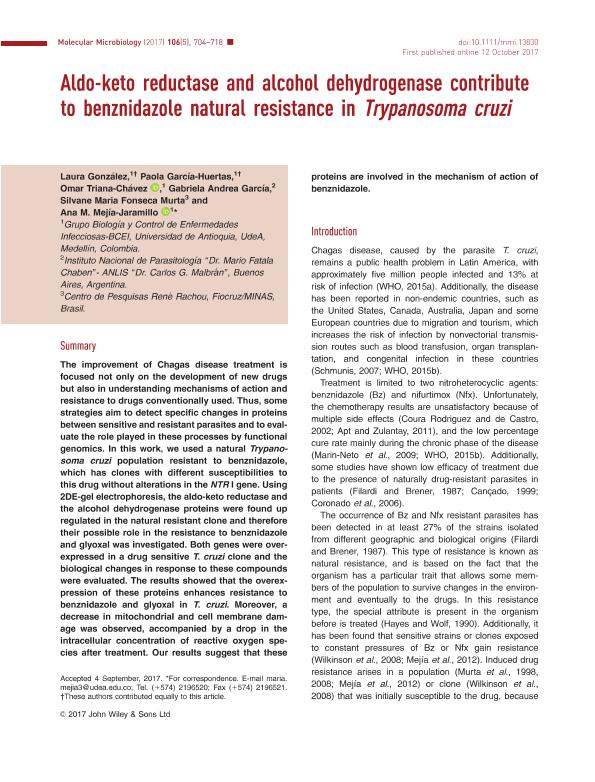Mostrar el registro sencillo del ítem
dc.contributor.author
González, Laura
dc.contributor.author
García Huertas, Paola
dc.contributor.author
Triana Chávez, Omar
dc.contributor.author
Garcia, Gabriela Andrea

dc.contributor.author
Murta, Silvane Maria Fonseca
dc.contributor.author
Mejía Jaramillo, Ana M.
dc.date.available
2019-03-20T17:51:21Z
dc.date.issued
2017-12
dc.identifier.citation
González, Laura; García Huertas, Paola; Triana Chávez, Omar; Garcia, Gabriela Andrea; Murta, Silvane Maria Fonseca; et al.; Aldo-keto reductase and alcohol dehydrogenase contribute to benznidazole natural resistance in Trypanosoma cruzi; Wiley Blackwell Publishing, Inc; Molecular Microbiology; 106; 5; 12-2017; 704-718
dc.identifier.issn
0950-382X
dc.identifier.uri
http://hdl.handle.net/11336/72106
dc.description.abstract
The improvement of Chagas disease treatment is focused not only on the development of new drugs but also in understanding mechanisms of action and resistance to drugs conventionally used. Thus, some strategies aim to detect specific changes in proteins between sensitive and resistant parasites and to evaluate the role played in these processes by functional genomics. In this work, we used a natural Trypanosoma cruzi population resistant to benznidazole, which has clones with different susceptibilities to this drug without alterations in the NTR I gene. Using 2DE-gel electrophoresis, the aldo-keto reductase and the alcohol dehydrogenase proteins were found up regulated in the natural resistant clone and therefore their possible role in the resistance to benznidazole and glyoxal was investigated. Both genes were overexpressed in a drug sensitive T. cruzi clone and the biological changes in response to these compounds were evaluated. The results showed that the overexpression of these proteins enhances resistance to benznidazole and glyoxal in T. cruzi. Moreover, a decrease in mitochondrial and cell membrane damage was observed, accompanied by a drop in the intracellular concentration of reactive oxygen species after treatment. Our results suggest that these proteins are involved in the mechanism of action of benznidazole.
dc.format
application/pdf
dc.language.iso
eng
dc.publisher
Wiley Blackwell Publishing, Inc

dc.rights
info:eu-repo/semantics/openAccess
dc.rights.uri
https://creativecommons.org/licenses/by-nc-sa/2.5/ar/
dc.subject
Chagas Disease
dc.subject
Chemotherapy
dc.subject
Drug
dc.subject.classification
Otras Ciencias Biológicas

dc.subject.classification
Ciencias Biológicas

dc.subject.classification
CIENCIAS NATURALES Y EXACTAS

dc.title
Aldo-keto reductase and alcohol dehydrogenase contribute to benznidazole natural resistance in Trypanosoma cruzi
dc.type
info:eu-repo/semantics/article
dc.type
info:ar-repo/semantics/artículo
dc.type
info:eu-repo/semantics/publishedVersion
dc.date.updated
2019-03-20T13:27:07Z
dc.journal.volume
106
dc.journal.number
5
dc.journal.pagination
704-718
dc.journal.pais
Reino Unido

dc.journal.ciudad
Londres
dc.description.fil
Fil: González, Laura. Universidad de Antioquia; Colombia
dc.description.fil
Fil: García Huertas, Paola. Universidad de Antioquia; Colombia
dc.description.fil
Fil: Triana Chávez, Omar. Universidad de Antioquia; Colombia
dc.description.fil
Fil: Garcia, Gabriela Andrea. Consejo Nacional de Investigaciones Científicas y Técnicas; Argentina. Dirección Nacional de Instituto de Investigación. Administración Nacional de Laboratorio e Instituto de Salud “Dr. C. G. Malbrán”; Argentina
dc.description.fil
Fil: Murta, Silvane Maria Fonseca. Centro de Pesquisas Rene Rachou; Brasil
dc.description.fil
Fil: Mejía Jaramillo, Ana M.. Universidad de Antioquia; Colombia
dc.journal.title
Molecular Microbiology

dc.relation.alternativeid
info:eu-repo/semantics/altIdentifier/url/https://onlinelibrary.wiley.com/doi/abs/10.1111/mmi.13830
dc.relation.alternativeid
info:eu-repo/semantics/altIdentifier/doi/https://dx.doi.org/10.1111/mmi.13830
Archivos asociados
